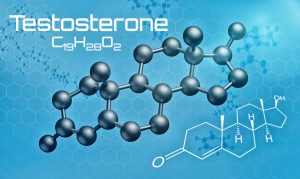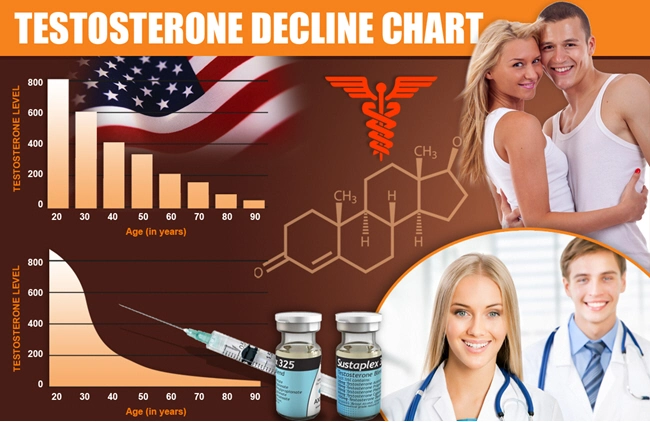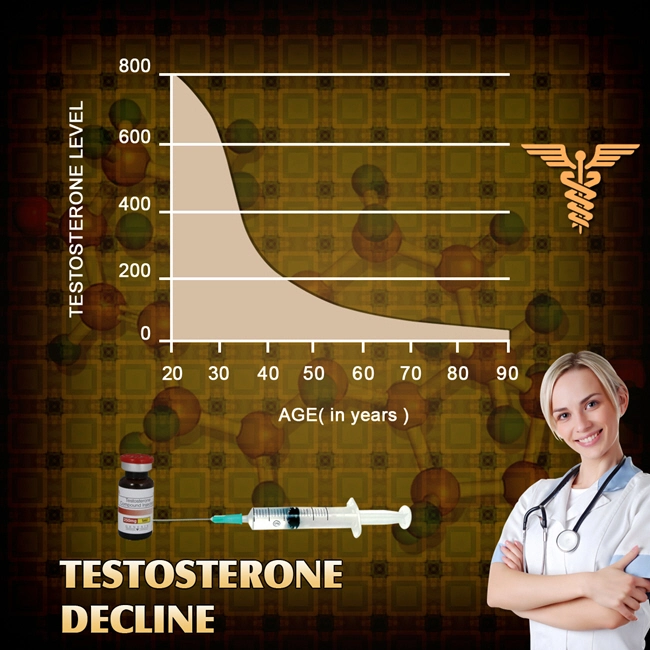
Video Link: https://vimeo.com/360410112
Video Download: Click Here To Download Video
Video Stream: Click Here To Stream Video
Testosterone is a critical male hormone for men and women; it is perhaps one of the most critical hormones in the endocrine system. But that being said, all hormones are essential and play a significant role in the symphony within your body.
It is responsible for strength, energy, a deep voice, strong bones, muscle development, libido (sex drive), body hair, mood, assertiveness ...and many more traits associated with masculinity. 
But there are more roles that testosterone plays in a man’s health.
Testosterone is vital in how men’s reproductive system (prostate gland health and testicles) develops and matures.
As important as the above-mentioned masculine characteristics are the protection that testosterone provides. Low testosterone levels (AKA “Low-T”) in men are associated with a broad range of health concerns, such as:
- Weak, shrinking muscles (Sarcopenia)
- Inflammation
- Joint aches and pains
- Chronic fatigue
- Dry, withered, wrinkled skin
- Brain fog and mental confusion
- A loss of flexibility
- Facts About Depression And Low Testosterone
- Erectile Dysfunction, Declining libido, and a decreased ability to sexually perform
- Weight gain and increasing accumulation of unhealthy fat
- Insulin resistance that leads to diabetes and the testosterone connection
- And more...much more
The above health afflictions demonstrate the importance of ensuring that a man’s testosterone is healthy and robust.
Testosterone Optimization: How do we determine the best Testosterone levels for men across their lifespan?
The importance of measuring testosterone cannot be overstated. But determining the right testosterone level is not as straightforward as it may seem.
Doctors measure testosterone in nanomoles per liter (nmol/l); males' standard “usual” healthy range is between 9.2 to 31.8 nmol/L.
Medical professionals from different societies, countries, or laboratories universally accept this range. But is this accurate for everyone? Not necessarily.
It is agreed that testosterone deficiency is responsible for many of the above-listed problems that men increasingly develop as they age. In fact, most of  those symptoms are similar in women who also have low testosterone.
those symptoms are similar in women who also have low testosterone.
Recent research indicates that low testosterone can be a risk factor for developing heart disease, diabetes, and obesity in both men and women.
This raises a chicken-vs-egg question: is a lack of testosterone a leading cause of the health problems that men (and women) encounter? Or does the disease cause testosterone levels to plummet, which might cause Metabolic Syndrome and weight gain? Regardless, Low-T often shows up when diseases strike.
Women’s testosterone levels are somewhat more steady, without known daily or yearly changes. As with men, however, they also decline with age. And it is these descending levels that increase the risk of disease.
What Is The Golden Mean For Testosterone Levels
Elevated testosterone levels in men rarely occur naturally. But too much testosterone as used by athletes and bodybuilders for ascetic and performance purposes, may cause heart problems.
The same risk applies to women. This tells us that testosterone looks most beneficial when it remains in a specific range: not too high or low...the “Golden Mean.”
To add to the complexity of determining healthy testosterone ranges, consider that testosterone levels fluctuate from decade to decade, year to year, and even daily. A man’s testosterone peaks around 4-8 AM and drops approximately twelve hours later.
Even the change of seasons enters the testosterone equation. Seasonal fluctuations will differ depending on the country and continent and increase levels by as much as 20%.
To make things even more complicated, consider this: there is no “one-size-fits-all”; everyone is slightly different, especially in how they respond to testosterone.
Testosterone does its job when it latches on to a cell receptor. However, here is where genetics comes into play. Some people are genetically inclined to have highly efficient cell receptors. Other folks are not so lucky.
Therefore, a low level for one person may be adequate if they have more sensitive cell receptors capable of delivering testosterone in lesser amounts. This may explain why some men can have low testosterone levels and not be stricken with disease, and the reverse is also true.
explain why some men can have low testosterone levels and not be stricken with disease, and the reverse is also true.
Also, there are other financial, environmental, and social factors at work. Where a person lives, income levels, exposure to toxins, stress levels, and ability to eat healthily all play an additional role in defining a “normal” testosterone range.
Research is ongoing to determine accurate and universal healthy testosterone levels – not too high and especially not too low. But at best, individual considerations always preclude finding the golden mean that applies to everyone.
Contact Our Testosterone And HGH Replacement Therapy Medical Clinic
Obviously, testosterone replacement therapy (TRT) is not something to take lightly. It is also not something to experiment with on your own. It would be best if you had the supervision of experts in the field of hormones.
 Our hormone replacement clinic is staffed with experienced, highly trained, and licensed professionals with decades of experience in hormone restoration.
Our hormone replacement clinic is staffed with experienced, highly trained, and licensed professionals with decades of experience in hormone restoration.
When you contact us to begin testosterone replacement, our initial evaluation will consider all the above facts. Our recommendations for your treatment regime will be tailor-made for you and only you.
We will find your “golden mean” for your ideal testosterone level.
Contact us for a free, no-obligation consultation.
References
Evolution of Guidelines for Testosterone Replacement Therapy.
Diurnal variations of plasma testosterone in men
Seasonal fluctuations in testosterone-estrogen ratio in men from the Southwest United States.
Contact Us Today For A Free Consultation
Dear Patient,
Once you have completing the above contact form, for security purposes and confirmation, please confirm your information by calling us.
Please call now: 1-800-380-5339.
Welcoming You To Our Clinic, Professor Tom Henderson.

- LabCorp Announces a Change to the Testosterone Reference Range [Last Updated On: April 16th, 2025] [Originally Added On: June 23rd, 2019]
- Important Facts About Testosterone Therapy Before Buying [Last Updated On: April 18th, 2025] [Originally Added On: July 13th, 2019]
- Soy: Does it Lower Testosterone? [Last Updated On: October 18th, 2024] [Originally Added On: August 30th, 2020]
- Testosterone Treatments May Successfully Reverse Type-2 Diabetes in Some Men [Last Updated On: April 15th, 2025] [Originally Added On: November 13th, 2020]
- Testosterone Replacement Therapy (TRT) May Prevent Heart Attacks and Diabetes [Last Updated On: April 21st, 2025] [Originally Added On: November 17th, 2020]
- Did You Know? Recent Studies Have Confirmed the Link Between Low Testosterone (“Low-T”) and Depression. [Last Updated On: April 17th, 2025] [Originally Added On: January 10th, 2021]
- New Study Finds Testosterone Does Not Increase Your Heart Attack Risk [Last Updated On: April 14th, 2025] [Originally Added On: January 11th, 2021]
- The Great Testosterone Debate [Last Updated On: April 20th, 2025] [Originally Added On: January 14th, 2021]
- Testosterone Replacement Therapy Lowers Heart Attack Risk [Last Updated On: April 19th, 2025] [Originally Added On: January 18th, 2021]
- New Study Says: The Benefits of Testosterone Replacement Therapy Outweigh The Risks [Last Updated On: April 22nd, 2025] [Originally Added On: January 19th, 2021]
- Male Menopause. Fact or Fiction ? [Last Updated On: April 23rd, 2025] [Originally Added On: January 20th, 2021]
- Testosterone: How Much Do You Really Know About This Masculine Hormone? [Last Updated On: October 6th, 2024] [Originally Added On: February 9th, 2021]
- Testosterone Therapy May Be Good for the Heart if You Have Low-T [Last Updated On: May 3rd, 2025] [Originally Added On: July 21st, 2021]
- A Recent Study Concludes: Testosterone DOES NOT Cause Prostate Cancer [Last Updated On: September 14th, 2025] [Originally Added On: August 16th, 2021]
- In the Battle Against Aging, When do the Risks Outweigh the Rewards? [Last Updated On: April 4th, 2025] [Originally Added On: August 18th, 2021]
- New Study Concludes: Boosting Testosterone Levels Lowers Men's Death Risk [Last Updated On: May 11th, 2025] [Originally Added On: August 20th, 2021]
- Testosterone Replacement Therapy Slows Prostate Cancer! [Last Updated On: April 2nd, 2025] [Originally Added On: September 13th, 2021]
- Research proves that Testosterone Therapy Boosts Fertility! [Last Updated On: April 5th, 2025] [Originally Added On: September 26th, 2021]
- Free Testosterone and Sex Hormone-Binding Globulin [Last Updated On: April 6th, 2025] [Originally Added On: October 15th, 2021]
- Testosterone Does Not Cause Heart Attacks [Last Updated On: April 7th, 2025] [Originally Added On: October 15th, 2021]
- Testosterone and Women [Last Updated On: April 8th, 2025] [Originally Added On: October 15th, 2021]
- Testosterone and Metabolic Syndrome [Last Updated On: April 3rd, 2025] [Originally Added On: October 15th, 2021]
- Testosterone and Disease Prevention [Last Updated On: March 31st, 2025] [Originally Added On: October 15th, 2021]
- Judge Vacates $140 Million Verdict in Testosterone Lawsuit [Last Updated On: April 1st, 2025] [Originally Added On: October 15th, 2021]
- Testosterone and Estrogen [Last Updated On: April 9th, 2025] [Originally Added On: October 16th, 2021]
- Testosterone and Aging [Last Updated On: April 10th, 2025] [Originally Added On: October 16th, 2021]
- Testosterone Replacement Therapy (TRT) Benefits [Last Updated On: April 11th, 2025] [Originally Added On: October 16th, 2021]
- Testosterone and Male Menopause [Last Updated On: March 30th, 2025] [Originally Added On: October 16th, 2021]
- Testosterone Battles Obesity [Last Updated On: March 29th, 2025] [Originally Added On: October 16th, 2021]
- Why You Need Testosterone Replacement Therapy [Last Updated On: May 14th, 2025] [Originally Added On: October 16th, 2021]
- Testosterone FAQ's [Last Updated On: May 13th, 2025] [Originally Added On: October 25th, 2021]
- How Testosterone Impacts Sexual Preferences In Men and Women [Last Updated On: March 28th, 2025] [Originally Added On: October 30th, 2021]
- Growth Hormone and The Thyroid Gland [Last Updated On: April 24th, 2025] [Originally Added On: November 19th, 2021]
- How Does Masturbation Affect Testosterone Levels? Exploring the Science [Last Updated On: May 24th, 2025] [Originally Added On: March 27th, 2022]
- Testosterone Therapy Increasingly Used to Help Men Take Control of Aging [Last Updated On: May 25th, 2025] [Originally Added On: May 30th, 2022]
- The many benefits of Testosterone Replacement Therapy (TRT) [Last Updated On: November 1st, 2025] [Originally Added On: June 13th, 2022]
- Tlando Testosterone - A Brand New Way to Treat Low-T Safely with a Testosterone Pill [Last Updated On: May 28th, 2025] [Originally Added On: July 12th, 2022]
- Safe Tlando Testosterone Changes Landscape of Low-T Therapy [Last Updated On: May 30th, 2025] [Originally Added On: August 15th, 2022]
- Systems to Monitor Testosterone Replacement Therapy (TRT) [Last Updated On: October 12th, 2025] [Originally Added On: September 21st, 2022]
- Testosterone May Help You Keep Your Job (Or Find Another) [Last Updated On: June 12th, 2025] [Originally Added On: October 4th, 2022]
- Toxic Chemicals are Killing your testosterone…And your Manhood! [Last Updated On: October 28th, 2024] [Originally Added On: October 10th, 2022]
- A new study reveals that Testosterone improves body composition in men with low testosterone! [Last Updated On: October 22nd, 2025] [Originally Added On: October 17th, 2022]
- A former Mr. Olympia speaks about testosterone [Last Updated On: October 10th, 2025] [Originally Added On: November 8th, 2022]
- Testosterone Blockers Thwart Melanoma [Last Updated On: June 9th, 2025] [Originally Added On: December 11th, 2022]








